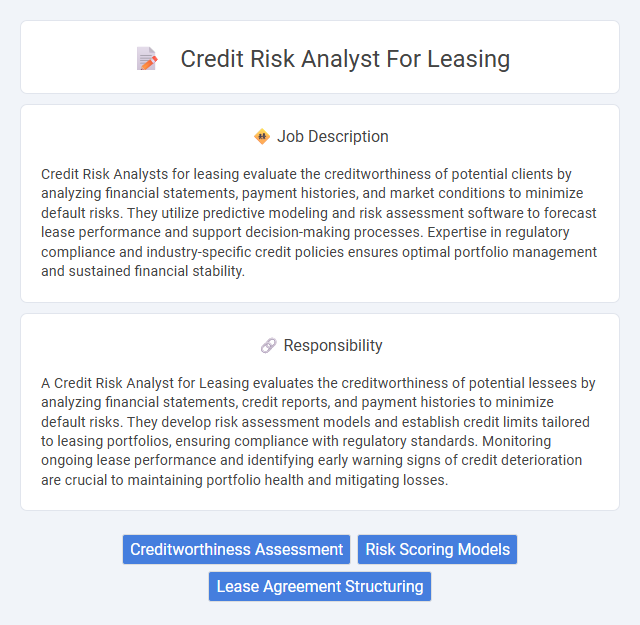
Credit Risk Analysts for leasing evaluate the creditworthiness of potential clients by analyzing financial statements, payment histories, and market conditions to minimize default risks. They utilize predictive modeling and risk assessment software to forecast lease performance and support decision-making processes. Expertise in regulatory compliance and industry-specific credit policies ensures optimal portfolio management and sustained financial stability.
Individuals with strong analytical skills and attention to detail are likely suitable for a Credit Risk Analyst role in leasing, as the job demands thorough evaluation of creditworthiness and risk factors. Those with experience in financial analysis, proficiency in data interpretation, and the ability to work under pressure might perform well in this role. Candidates lacking these skills or a solid understanding of credit principles may find it challenging to succeed in this position.
Qualification
A Credit Risk Analyst for Leasing requires a strong background in finance, accounting, or economics, typically holding a bachelor's degree in these fields. Proficiency in risk assessment models, credit scoring techniques, and leasing industry regulations is essential to accurately evaluate lessee creditworthiness. Advanced skills in data analysis tools such as Excel, SQL, and financial software enhance decision-making efficiency in managing leasing portfolios.
Responsibility
A Credit Risk Analyst for Leasing evaluates the creditworthiness of potential lessees by analyzing financial statements, credit reports, and payment histories to minimize default risks. They develop risk assessment models and establish credit limits tailored to leasing portfolios, ensuring compliance with regulatory standards. Monitoring ongoing lease performance and identifying early warning signs of credit deterioration are crucial to maintaining portfolio health and mitigating losses.
Benefit
A Credit Risk Analyst for Leasing likely enhances the accuracy of risk assessments, potentially reducing defaults and financial losses. This role may improve decision-making processes by leveraging data-driven insights, increasing overall portfolio performance. Employers could benefit from more reliable credit evaluations, leading to optimized leasing strategies and stronger client relationships.
Challenge
Credit Risk Analysts for Leasing often face the challenge of accurately predicting tenant default probability while navigating incomplete financial data. The complexity of evaluating diverse lease agreements and fluctuating market conditions may increase uncertainty in risk assessment. This role likely demands advanced analytical skills and adaptability to evolving economic environments.
Career Advancement
Credit Risk Analysts in leasing play a crucial role in evaluating and mitigating financial risks associated with lease portfolios, utilizing advanced credit modeling and data analysis techniques. Mastery in credit risk assessment tools, regulatory compliance, and market trend analysis can lead to career advancement opportunities such as Senior Credit Analyst, Risk Manager, or Leasing Portfolio Manager. Developing expertise in predictive analytics and gaining certifications like CFA or FRM often accelerate progression into strategic leadership roles within financial institutions.
Key Terms
Creditworthiness Assessment
A Credit Risk Analyst for Leasing evaluates the creditworthiness of potential lessees by analyzing financial statements, credit reports, and payment histories to determine the likelihood of timely lease payments. They utilize risk assessment models and scoring systems to identify potential default risks and ensure compliance with lending policies. This role requires expertise in financial data analysis, risk mitigation strategies, and regulatory standards relevant to leasing agreements.
Risk Scoring Models
Credit Risk Analysts in leasing utilize risk scoring models to evaluate the creditworthiness of potential lessees by analyzing financial data, payment history, and market trends. These models incorporate variables such as debt-to-income ratios, credit scores, and leasing terms to predict default probabilities and optimize lease approval decisions. Accurate risk scoring enhances portfolio quality, minimizes losses, and supports strategic risk management in leasing operations.
Lease Agreement Structuring
A Credit Risk Analyst for Leasing specializes in evaluating financial data to assess the creditworthiness of lessees and structuring lease agreements that mitigate risk while maximizing profitability. This role involves analyzing lease terms, payment schedules, collateral, and market conditions to design agreements that comply with regulatory standards and reflect the lessee's credit profile. Expertise in lease agreement structuring ensures balanced risk distribution, protects asset value, and supports the leasing company's financial stability.
 kuljobs.com
kuljobs.com